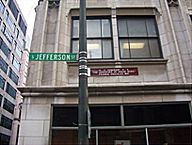| Entries |
| R |
|
Rap
|

|
Rap is unique as a musical genre; all other urban genres of the century, including jazz, blues, and disco, have flourished in Chicago. House music, which, with its use of sequencers, synthesizers, and samples, is parallel to rap, arose in gay African American clubs in the West Loop as rap was taking shape.
During the second half of the 1990s, Chicago produced a few rappers of note, though this hardly equaled the impact made on both coasts. Chicago rap acts have originated from the city's South and West Sides and include Twista (formerly Tung Twista, known for his rapid-fire vocal style), Do or Die, and Crucial Conflict, which had a minor hit in 1996 with “Hay.” The most important rap artist to emerge from Chicago, Common (formerly Common Sense), has introduced confession and introspection to a genre not known for exploring these softer sentiments. Common's success has fueled the ambitions of other local rappers, including Grav, Rubberoom, No I.D., and All Natural.
The Encyclopedia of Chicago © 2004 The Newberry Library. All Rights Reserved. Portions are copyrighted by other institutions and individuals. Additional information on copyright and permissions.